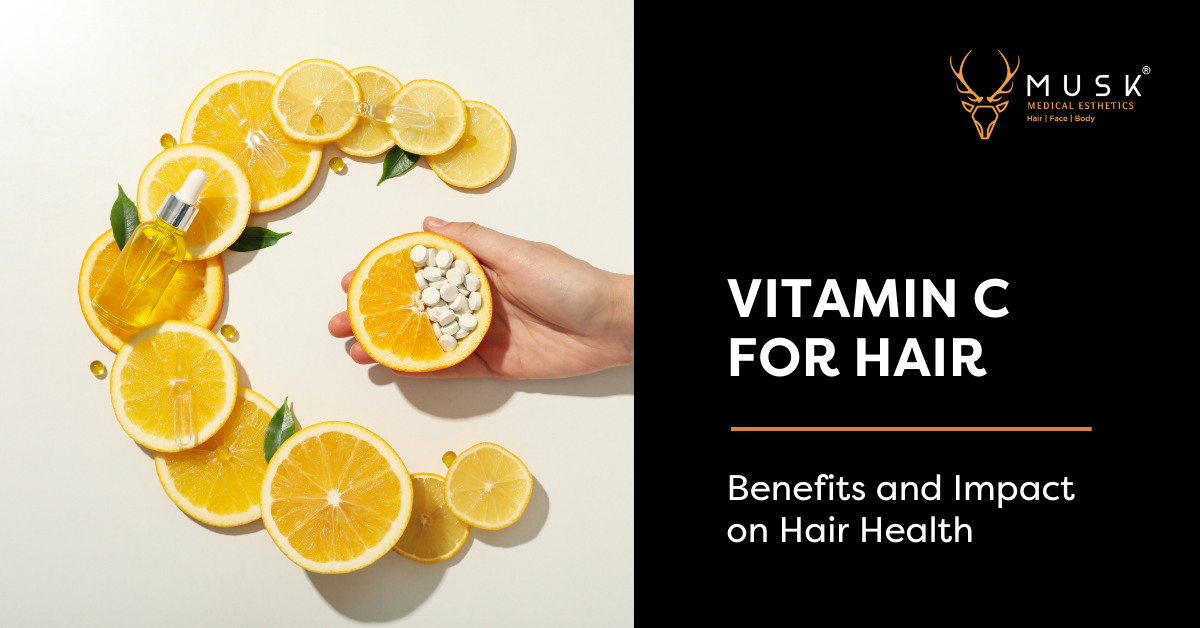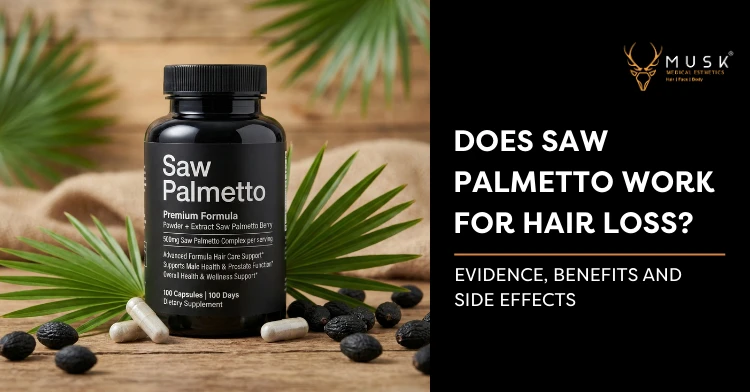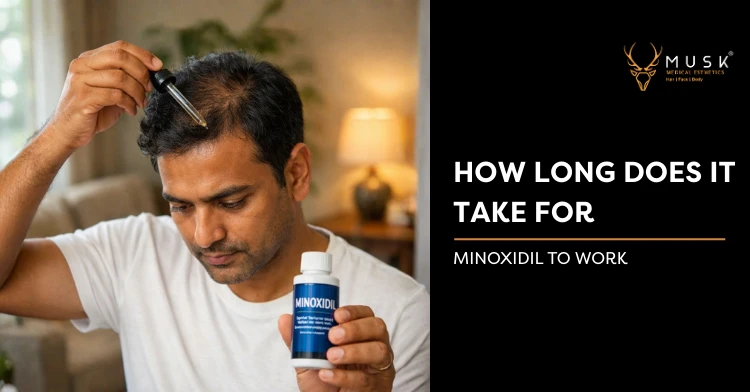Vitamin C for Hair – Benefits and Impact on Hair Health

Have you ever wondered why your hair doesn’t seem as vibrant and strong as it used to be? The answer might be simpler than you think. While many factors contribute to hair health, vitamins—particularly Vitamin C—play a crucial role that’s often overlooked.
At Musk Clinic, Ahmedabad’s premier destination for hair restoration and cosmetic procedures, we’ve seen firsthand how nutritional factors impact hair treatment outcomes. Our experts combine cutting-edge treatments like ARTAS 9X Robotic Hair Transplant with holistic approaches for comprehensive hair care.
Today, we’re diving deep into how this everyday vitamin might be the missing piece in your hair health puzzle.
What exactly is Vitamin C?
Vitamin C, also known as ascorbic acid, is a water-soluble vitamin that your body can’t produce on its own. Unlike some animals that can convert glucose into Vitamin C, humans need to obtain it through diet or supplements.
This powerful nutrient acts as an antioxidant, protecting your cells from damage caused by free radicals. It’s also essential for collagen production, immune function, and iron absorption—all of which indirectly impact your hair’s condition.
While you might associate Vitamin C primarily with immune health and fighting off colds, its benefits extend far beyond reaching all the way to your hair follicles.
What does Vitamin C do for your hair?
When it comes to hair health, Vitamin C works behind the scenes in several crucial ways:
1. How does Vitamin C promote hair growth?
Vitamin C is instrumental in creating collagen, a protein that forms the structure of hair strands. Without adequate collagen, your hair may become brittle and prone to breakage before reaching its full-length potential.
Additionally, this vitamin enhances blood circulation to the scalp, ensuring your hair follicles receive the oxygen and nutrients they need to produce healthy hair. Better circulation means better growth cycles and potentially thicker hair.
2. Can Vitamin C protect hair from damage?
As a powerful antioxidant, Vitamin C neutralizes free radicals that would otherwise damage hair follicles. Environmental stressors like pollution, UV radiation, and even normal metabolic processes create these harmful compounds.
By neutralizing free radicals, Vitamin C helps maintain a healthy scalp environment—the foundation for strong, resilient hair. Think of it as a shield protecting your hair at its source.
3. Does Vitamin C help with nutrient absorption?
One of Vitamin C’s lesser known but crucial function is enhancing iron absorption. Iron deficiency is a common cause of hair loss, particularly in women. By improving your body’s ability to absorb iron, Vitamin C indirectly supports healthy hair growth.
This synergistic relationship between Vitamin C and iron highlights why a holistic approach to nutrition is essential for addressing hair concerns—something we emphasize in our consultations at Musk Clinic.
Top benefits of Vitamin C for hair
Let’s break down the specific ways Vitamin C can transform your hair health:
1. Stronger hair strands
- Boosts collagen production, which forms the structure of hair
- Improves hair elasticity, reducing breakage
- Strengthens the hair shaft from within
- Creates more resilient hair that withstands styling and environmental stress
2. Reduced hair fall and thinning
- Protects hair follicles from oxidative stress
- Supports healthy blood circulation to the scalp
- Helps maintain the anagen (growth) phase of hair
- Prevents premature hair shedding due to weak follicles
3. Enhanced scalp health
- Fights inflammation that can impair follicle function
- Helps maintain proper pH balance on the scalp
- Reduces dandruff and flakiness
- Creates an optimal environment for new hair growth
4. Better hair colour retention
- Protects against premature greying by combating oxidative stress
- Helps maintain natural hair pigmentation
- Enhances shine and vibrancy of both natural and coloured hair
- Reduces color fading from environmental factors
5. Faster hair growth
- Supports efficient nutrient delivery to follicles
- Removes growth-inhibiting free radicals
- Enhances the effectiveness of other hair nutrients
- May help extend the anagen (growth) phase of the hair cycle
These benefits make Vitamin C an essential component of any comprehensive hair care routine, especially for those undergoing treatments for hair loss or thinning at specialized facilities like Musk Clinic.
What are the signs of Vitamin C deficiency affecting your hair?
Your hair often serves as a barometer for your overall health, particularly your nutritional status. Here are tell-tale signs that insufficient Vitamin C might be affecting your locks:
1. Is your hair looking dull and lifeless?
One of the earliest signs of Vitamin C deficiency is a noticeable lack of shine and vibrancy in your hair. Without adequate Vitamin C, collagen production suffers, resulting in hair that appears dull, lacks luster, and feels rough to the touch.
This occurs because collagen helps form the cuticle layer that reflects light and gives hair its natural shine. When this structural component is compromised, your hair loses its reflective properties.
2. Are you experiencing increased hair breakage?
When your body lacks sufficient Vitamin C, hair becomes structurally weaker and more prone to breakage. You might notice more hairs breaking mid-shaft rather than coming out from the root.
This fragility stems from inadequate collagen formation, leading to hair that can’t withstand normal styling, brushing, or environmental stressors.
3. Is your hair thinning more than usual?
Chronic Vitamin C deficiency can disrupt the normal hair growth cycle, pushing more hairs into the telogen (shedding) phase prematurely. This manifests as overall thinning and reduced hair density.
At Musk Clinic, we often assess nutritional factors, including Vitamin C status, when evaluating patients for hair thinning, as addressing these deficiencies can complement medical treatments like PRP hair therapy.
4. Do you have a dry, flaky scalp?
Vitamin C plays a role in maintaining skin health, including your scalp. Insufficient levels can lead to a dry, irritated scalp environment that hampers healthy hair growth.
This poor scalp condition creates a cycle where new hair emerges into an unfavourable environment, further compromising its strength and appearance.
5. Are your hair follicles becoming clogged?
Inadequate Vitamin C can affect the skin’s natural exfoliation process, leading to build up around hair follicles. This buildup can obstruct new hair growth and contribute to conditions like folliculitis.
Addressing Vitamin C deficiency, along with proper scalp care, can help maintain clear, functional follicles—essential for treatments like hair transplantation to yield optimal results.
How to get more Vitamin C for healthier hair
Incorporating more Vitamin C into your routine doesn’t have to be complicated. Here are practical ways to ensure you’re getting enough of this hair-friendly nutrient:
1. Which foods are rich in Vitamin C?
The most bioavailable form of Vitamin C comes from fresh foods. Include these Vitamin C powerhouses in your diet:
- Citrus fruits (oranges, lemons, grapefruits)
- Berries (strawberries, blueberries, raspberries)
- Bell peppers, particularly red and yellow varieties
- Kiwi fruit, which contains more Vitamin C than oranges
- Broccoli and other cruciferous vegetables
- Papaya and guava, tropical fruits with exceptional Vitamin C content
- Tomatoes, especially when cooked, which increases bioavailability
- Leafy greens like spinach and kale
Aim to include at least two Vitamin C-rich foods in your daily diet to support not just your hair but overall health.
2. When should you consider Vitamin C supplements?
Dietary supplements can be beneficial when:
- Your diet lacks variety of fruits and vegetables
- You have increased needs due to stress or illness
- You’re a smoker (smoking depletes Vitamin C levels)
- You’re undergoing treatments that increase oxidative stress
- Blood tests indicate suboptimal Vitamin C levels
At Musk Clinic, we often recommend nutritional testing before major procedures like hair transplantation to identify and address deficiencies that might affect healing and results.
3. What hair care products contain Vitamin C?
Topical application of Vitamin C can complement your internal supplementation:
- Vitamin C-infused shampoos that gently cleanse while delivering antioxidants
- Leave-in conditioners with Vitamin C to protect hair throughout the day
- Scalp serums that combine Vitamin C with other actives for follicle health
- Hair masks that provide intensive Vitamin C treatment for damaged hair
- Pre-shampoo treatments that prepare the scalp for optimal nutrient absorption
These products work best as part of a comprehensive approach that addresses both internal nutrition and external care.
4. How to make a DIY Vitamin C hair treatment
For a cost-effective option, try this simple home treatment:
1. Mix 1 tablespoon of Vitamin C powder with your regular shampoo
2. Apply to wet hair, massaging into the scalp and along hair shafts
3. Leave for 5-10 minutes to allow absorption
4. Rinse thoroughly and follow with conditioner
5. Use once weekly to brighten hair and improve scalp health
Note that DIY treatments complement but don’t replace professional care, especially for significant hair or scalp conditions.
Can Vitamin C stop hair fall or help in regrowth?
This is perhaps the most common question we receive at Musk Clinic regarding Vitamin C. Let’s examine what the science tells us:
1. What does research say about Vitamin C and hair loss?
Clinical research demonstrates that Vitamin C deficiency is linked to hair loss patterns similar to those seen in conditions like telogen effluvium, where more hairs than normal enter the shedding phase.
Studies also show that oxidative stress—which Vitamin C helps combat—plays a significant role in androgenetic alopecia (pattern baldness) and alopecia areata (spot baldness).
However, it’s important to understand that Vitamin C works best as part of a multi-faceted approach rather than a standalone solution for established hair loss.
2. What are realistic expectations for using Vitamin C for hair?
When incorporating Vitamin C into your hair care regimen, you can realistically expect:
- Gradual improvement in hair strength over several weeks
- Reduced breakage and shedding after 1-2 months of consistent use
- Improved scalp condition within weeks
- Enhanced results from other hair treatments
What you shouldn’t expect:
- Immediate reversal of long-standing pattern baldness
- Complete regrowth in areas where follicles have become dormant for years
- Results without consistent, long-term use
At Musk Clinic, we help set realistic expectations while offering complementary treatments like PRP therapy that can work synergistically with nutritional approaches.
3. How long does it take to see results from Vitamin C?
The timeline for visible improvements varies based on:
- Your baseline Vitamin C levels
- The extent of existing hair issues
- Whether you’re addressing internal or external use (or both)
- Your overall nutritional and health status
Generally, most people notice improved hair texture and reduced shedding within 4-6 weeks of correcting a Vitamin C deficiency. More significant changes in growth patterns may take 3-6 months—similar to most hair interventions.
How Vitamin C complements Musk Clinic’s hair treatments
At Musk Clinic in Ahmedabad, we integrate nutritional approaches with cutting-edge medical treatments. Here’s how Vitamin C specifically enhances our signature procedures:
1. Vitamin C and ARTAS 9X Robotic Hair Transplant
Our state-of-the-art ARTAS 9X Robotic Hair Transplant represents the pinnacle of hair restoration technology. Adequate Vitamin C levels support:
- Enhanced healing of donor and recipient sites
- Reduced post-procedure inflammation
- Better graft survival rates
- Improved collagen formation during recovery
- Protection of newly transplanted follicles from oxidative stress
We often recommend optimizing Vitamin C status before undergoing this premium hair transplant in India to maximize your investment and ensure optimal outcomes.
2. How Vitamin C boosts PRP hair therapy results
Platelet-Rich Plasma (PRP) therapy harnesses your body’s own growth factors to stimulate hair follicles. Vitamin C enhances this treatment by:
- Supporting the collagen matrix that PRP helps rebuild
- Extending the longevity of PRP treatment results
- Amplifying the antioxidant environment created by PRP
- Improving overall scalp health, making it more receptive to PRP
- Enhancing blood vessel formation that delivers nutrients to follicles
Our patients who maintain optimal Vitamin C levels typically report more satisfying and longer-lasting results from their PRP hair therapy sessions.
3. Supporting results from FUT and FUE procedures
For patients undergoing Follicular Unit Transplantation (FUT) or Follicular Unit Extraction (FUE), Vitamin C plays several supportive roles:
- Accelerates wound healing at both donor and recipient sites
- Reduces risk of post-procedure infection
- Supports formation of new blood vessels to nourish transplanted follicles
- Minimizes scarring through proper collagen formation
- Protects new hair growth from environmental damage
Our surgeons at Musk Clinic often emphasize nutritional preparation, including adequate Vitamin C levels, as part of the pre-operative protocol.
4. Enhancing medicinal hair loss treatments
When combined with prescription medications for hair loss, Vitamin C can:
- Improve drug delivery to the follicle through enhanced circulation
- Reduce potential oxidative stress from certain medications
- Support overall follicle health during treatment
- Create a more favourable scalp environment for medication efficacy
- Address complementary pathways in hair loss not targeted by medications
This holistic approach represents the philosophy behind Musk Clinic’s comprehensive treatment protocols.
Before & After: The Vitamin C Difference in Hair Treatments
| Aspect | Without Vitamin C Support | With Vitamin C Support |
|---|---|---|
| Recovery Time | Standard recovery period with typical redness and swelling | Potentially faster healing with reduced inflammation |
| Transplant Success Rate | Normal graft survival rate | Potentially improved graft survival due to better antioxidant protection |
| Result Longevity | Standard duration of results | Possibly extended benefits due to ongoing protection of follicles |
| Hair Quality | Basic improvement in density | Enhanced shine, strength, and overall quality of new and existing hair |
| Scalp Health | Focus primarily on hair without addressing scalp | Improved overall scalp environment supporting treatment success |
| Protection From Future Loss | Treatment addresses current concerns only | Added protection against oxidative stress-related future thinning |
| Collagen Support | Limited to natural production | Enhanced collagen formation supporting stronger hair structure |
| Overall Value | Standard treatment outcomes | Maximized return on investment through optimized results |
This comparison illustrates why we at Musk Clinic emphasize a comprehensive approach that includes nutritional optimization alongside our advanced medical treatments.
Key takeaways about Vitamin C for hair health
As we’ve explored throughout this article, Vitamin C offers numerous benefits for hair health that complement professional treatments:
- It’s essential for collagen production, providing structural support for hair strands
- Its antioxidant properties protect follicles from damage that can lead to hair loss
- Vitamin C improves blood circulation, delivering vital nutrients to the scalp
- It enhances iron absorption, addressing a common nutritional cause of hair thinning
- Regular intake can improve scalp health, creating an optimal environment for growth
- When combined with professional treatments, it may enhance and extend results
At Musk Clinic, we believe in addressing hair concerns from multiple angles—combining the best of advanced medical treatments with nutritional and lifestyle optimization.
Your next steps for healthier hair
Ready to transform your hair health? Here’s how to move forward:
1. Schedule a comprehensive hair assessment
Our specialists at Musk Clinic offer in-depth consultations that analyze not just your hair concerns but potential underlying factors—including nutritional status—that may be contributing to your issues.
With over a decade of specialized expertise, our hair restoration specialists can develop a personalized treatment plan that addresses your specific needs, whether that includes our signature ARTAS Robotic Hair Transplant, PRP therapy, or other specialized treatments.
2. Optimize your Vitamin C intake
Start incorporating more Vitamin C-rich foods into your diet today. Consider supplements if you struggle to maintain adequate levels through diet alone, especially if you’re planning to undergo any hair restoration procedures.
Remember that consistency is key—nutritional approaches work best when maintained over time as part of a comprehensive hair care strategy.
3. Explore our advanced hair restoration options
As the best clinic for hair transplant in Ahmedabad, Musk Clinic offers solutions that can transform your appearance and confidence:
- ARTAS 9X Robotic Hair Transplant: The most advanced, precise method of hair restoration available today
- PRP Hair Therapy: Harness your body’s natural growth factors to revitalize hair follicles
- Microbotox Therapy: Innovative treatment that addresses scalp tension and improves circulation
- FUT and FUE Procedures: Traditional yet effective surgical options for hair restoration
- Medicinal Hair Loss Treatment: Non-surgical approaches for early intervention
4. Contact Musk Clinic today
Don’t let hair concerns affect your confidence any longer. Our team of hair restoration experts is ready to help you achieve the results you deserve through our comprehensive approach to hair restoration.
Call us at 70430 06599 or book an appointment online to begin your journey to healthier, fuller hair with the support of Ahmedabad’s premier hair restoration experts.
Remember, when it comes to hair health, addressing both the internal and external factors yields the best results—something we specialize in at Musk Clinic.











